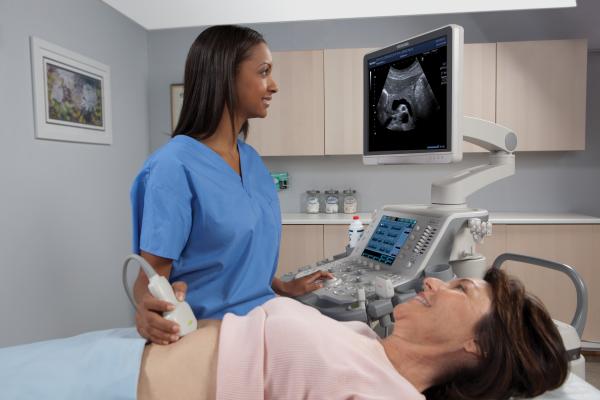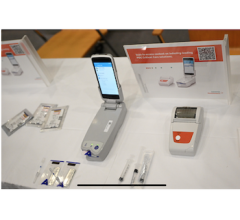
Photo courtesy of Toshiba
Ultrasound has become an essential tool for diagnostic and procedural uses in the critical care environment. The May issue of Anesthesia & Analgesia outlines a new set of basic ultrasound learning skills developed specifically for use in anesthesiology-critical care medicine (ACCM) training programs.
An expert panel of the Society of Critical Care Anesthesiologists (SOCCA) outlines a set of "standard, evidence-based clinical indications, learning goals, and competencies for the use of ultrasound in ACCM." The lead author of the training recommendations is R. Eliot Fagley, M.D., of Virginia Mason Medical Center, Seattle.
Ultrasound in the Critical Care Unit — What Skills Do ACCM Specialists Need?
With advances in technology and equipment, ultrasound has found new uses for rapid assessment at the bedside in many areas of the hospital, including the critical care unit. Many critical care practitioners, including ACCM physicians — anesthesiologists with subspecialty training in critical care medicine — have undergone formal ultrasound training programs. "Immediate bedside availability of ultrasound resources can dramatically improve the ability of critical care physicians to care for critically ill patients," Fagley and coauthors wrote.
The SOCCA expert panel was tasked with developing learning goals to provide the next generation of ACCM specialists with the knowledge and skills they need to use ultrasound-based strategies in the critical care unit. An initial survey found that most ACCM training programs offer some type of ultrasound training, although many did not yet include it as a formal element of the curriculum.
Based on review of the research evidence and expert opinion, the panel outlines learning goals and expected competencies in four main areas: vascular, abdominal, and thoracic/pulmonary ultrasound and cardiac echocardiography:
• Vascular ultrasound plays an important role in critical care procedures requiring access to blood vessels and the circulatory system. Ultrasound is used to guide needle and catheter placement for various procedures and to aid in diagnosis of vascular conditions such as venous thromboembolism (blood clots blocking blood flow).
• Abdominal ultrasound can help to diagnose a wide range of abdominal conditions—for example, fluid or blood collections, ruptured aneurysms, or kidney or liver failure. It also plays a key role in rapid assessment of trauma victims.
• Thoracic/pulmonary ultrasound also plays an important role in trauma assessment, as well as in evaluating pneumonia or other conditions affecting the chest and lungs.
• Cardiac echocardiography can provide essential information on the heart and its function in critically ill patients. Anesthesiology-critical care specialists should be competent in transthoracic echocardiography ultrasound (through the chest wall), including rapid evaluation of patients in shock or after trauma; and have basic skills in transesophgeal echocardiography (using a probe placed in the esophagus).
In each area, the recommendations define expectations for levels of training and mastering ultrasound interpretation and technical skills. They recommend that all residents perform at least 50 ultrasound examinations during their training, each reviewed with a local expert.
"Anesthesia-critical care medicine training should have definitive expectations and performance standards for basic critical care ultrasound interpretation," according to Fagley and the SOCCA expert panel. They believe their recommended learning goals will help in ensuring that ACCM specialists have the knowledge and skills they need for effective use of ultrasound in their critical care practice.
For more information: http://socca.org/


 February 16, 2026
February 16, 2026 









